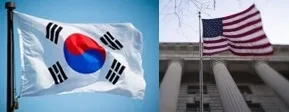Trump's Tariff Strategy Raises Concerns for South Korea-US Relations

Synopsis
Key Takeaways
- Trump's reciprocal tariffs deepen South Korea's trade concerns.
- New tariffs could threaten the bilateral FTA.
- South Korea's economy, reliant on exports, faces challenges.
- Political instability in South Korea complicates trade dynamics.
- Global economic growth may decline due to these tariffs.
Washington, April 3 (NationPress) The recent declaration by U.S. President Donald Trump regarding "reciprocal" tariffs has intensified South Korea's reflections on its increasing dependence on the United States for trade. This protectionist shift threatens the viability of the existing bilateral free trade agreement (FTA).
Trump has introduced a 10 percent "baseline" tariff on imports from all trading partners, along with reciprocal tariffs that include a hefty 26 percent duty for South Korea. This move is part of his broader initiative aimed at reducing America's trade deficits, enhancing revenue, attracting foreign investments, and bolstering domestic manufacturing.
The implementation dates for the baseline and reciprocal tariffs are set for Saturday and next Wednesday, respectively. Trump has reiterated his commitment to amend what he describes as "unfair" foreign trade practices that have "ripped off" America for far too long, as reported by Yonhap news agency.
For South Korea, which heavily relies on exports, the newly imposed U.S. tariffs, including the proposed 25 percent tariffs on imported cars and parts, raise critical questions on how to recalibrate the trade dynamics with the U.S. under a potential new agreement while avoiding the unforeseen repercussions of economic interdependence.
This tariff announcement has also contributed to the growing uncertainties surrounding the future of the South Korea-U.S. relationship, especially during a politically unstable period in Seoul, marked by President Yoon Suk Yeol's brief martial law and subsequent impeachment in December.
During a White House event showcasing tailored reciprocal tariffs, Trump characterized the new duties as "kind" and "common sense", asserting that the U.S. would impose only half the rate each targeted country was meant to pay.
The executive order's annex on the White House website revealed 34 percent reciprocal tariffs for China, 20 percent for the European Union, 46 percent for Vietnam, 32 percent for Taiwan, 24 percent for Japan, 27 percent for India, 37 percent for Thailand, 32 percent for Switzerland, 32 percent for Indonesia, 24 percent for Malaysia, and 49 percent for Cambodia.
Wendy Cutler, vice president of the Asia Society Policy Institute and former negotiator of the South Korea-U.S. FTA, remarked, "Our Asian FTA partners were not spared, with Korea's rate at the upper end at 25 percent", later revised to 26 percent.
She added, "Asian countries have been particularly impacted, facing severe economic challenges due to their export-oriented economies. While the president has emphasized that he could have imposed much higher rates, our partners are unlikely to perceive his actions as 'kind.'"
Cutler anticipated that U.S. trading partners would feel domestic pressure to respond while assisting their businesses in navigating the tariff challenges.
She warned, "We can expect global economic growth to start plummeting as trade flows decline, prices increase, and businesses postpone investments. Foreign delegations will likely swarm Washington seeking exceptions."
Numerous analysts have cautioned that Trump's tariff measures could undermine America's reputation for reliability.










